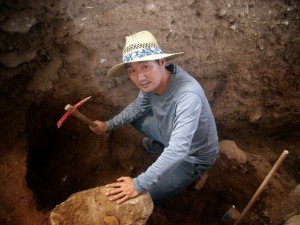A Student in the “Holy Land”
10-17-2014
By Je Myoung Lee
MDiv student Je Myoung Lee visited the Holy Land in the summer of 2014 to participate in archaeological excavation and Arabic language study, with a little time to travel Egypt.
I went to the Near East last summer with the assistance of two awards with quite long names: the “John Hayes Creighton Fund for Graduate Study in the Holy Land,” and the “George L. Robinson, Ovid R. Sellers, and Ernest Wright Archaeological Award” from McCormick Theological Seminary. My life has been always full of travels, life itself is a journey, but this was the longest travel since my marriage. Two months can be either super long or relatively short. I am very thankful that other McCormick students did not apply for the awards so that I got the full funds. But now, I truly want other students have these experiences too.
When I planned the trip, I wanted to study three things – travel, archaeology, and language. I travelled all over Israel: from Tel Dan and Golan Heights to Eilat in Israel. In Jerusalem, I walked everywhere for a week. I traveled many places in Palestine, and additionally I went to Egypt and Jordan. The trip was so awesome, I was amazed by the ancient civilization, and enjoyed the Mediterranean and Red Sea. For studying archaeology, I applied for Lachish excavation by Hebrew University. Lachish is an amazing place, where we can find evidence of Babylonian conquest of Lachish from the Biblical and the Babylonian texts, along with many other archaeological findings. Digging up the actual pottery and Babylonian arrowheads is a great thrill. Unfortunately, Hebrew University shut down the site and relocated me to Megiddo excavation by Tel Aviv University because of the incoming rockets in Lachish. Lachish is the Southern centre of ancient Israel, while Megiddo is the Northern centre. I have to say that the excavation is very hard labor, especially under the burning sun. The evening lectures exhausted me, but they were very informative and interesting.
I spent my last four weeks in Beit Sahour, next to Bethlehem in Palestine, learning beginner’s Arabic in Palestinian dialect at Bethlehem University. I found many similarities between Arabic and (Biblical) Hebrew. The class was very good and recent McCormick alum Mara Forster-Smith took the same course in July, one month earlier than I did.
I would like to say that this trip was very unique because the most recent conflict broke out three days after I arrived, and it ceased three days before I left; so I was there for the entire conflict. Sometimes Icounted 28 rockets towards me in just three minutes. One day my neighbour’s house got hit by a rocket. I would hear bombers flying over my head.
I tried to talk to as many people as possible during this trip. That was the beauty of travelling alone. When we travel in a group, we tend to stay only within the group and have few chances to talk to the local people except the tour guide. This time I talked to many people that I encountered on the streets in Israel, Palestine, Egypt and in Jordan. I met many bad people who tried to rip off the tourists by cheating. But I also met many good people helping tourists like me. I had many deep conversations with both secular and religious people of Israel and Palestine. I found that more secular people were open to conversation, but the more religious people had more rigid and aggresive opinions. This is very ironic to me and made me ponder and think about religion deeply.
Besides the war, I witnessed how the daily lives of Palestinians are restricted and limited. They cannot decide their own destiny. They even need permits from Israel to travel within their own land of Palestine. We need to help them.
One thing that amazed me was my encounters with Arab Christians, which I did not know still existed in the area. Especially in Bethlehem and Beit Sahour, there are so many Christians and they are holding their faith for generations. Most of them say that they are Christians at least for ten generations. They are happy and thankful to be Christians but their life is not that safe and secure. Israelis hate Palestinians. And Muslim Palestinians (they are the absolute majority) hate Christian Palestinians.
Both Jews and Muslims say “Peace” hundreds of times a day as greetings. But they do not have peace at all. Christians, Jews, and Muslims say that this is the holy land. But people in the Holy Land do not always live in a holy way. They kill people in God’s name. I now think that the Holy Land is not actual holy land. But if we live in a holy way– loving people in God’s love and caring for them, then the place where we live is the true Holy Land.
This trip, I believe, broadened my perspectives. Through this travel, I grew a lot mentally, and also spiritually. I thank God first, and also McCormick Theological Seminary for giving me this opportunity.
Je Myoung Lee is a second-year MDiv student at McCormick Theological Seminary. For more information about scholarship/fellowship opportunities for study in the Holy Land, contact the McCormick Admissions Office.
Je Lee on an archaeological dig in Lachish
Debris from a rocket that hit a Palestinian home in Beit Sahour
Je counted 28 rockets in just 3 minutes near Lachish. Israel’s Iron Dome defense system intercepted most of them.





